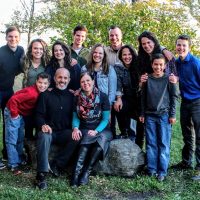The common saying is,
“It takes a village to raise a child.”
This statement is still true today. I grew up on my grandfather’s farm surrounded by my extended family. I saw both sets of grandparents multiple times a week. In addition to the family, my parents had several different couples who become like aunts and uncles to me and to my brothers. Those people are still in our lives today.
Do your kids need community?
What We Desire for Our Children
As a child, I loved the community my parents built for us because I loved playing with all the kids when they came to our house. My parents hosted a weekly Bible Study for the adults. As I grew older, the adults became trusted voices and cheerleaders in my life.
When I think about my children as adults, there are certain qualities I desire for them. I want them to know God intimately, to trust God’s word in the Bible, to be a person of integrity, to have joy, to choose friends and a spouse who compliment them and push them to be more like Jesus.
My husband and I have committed to building a home culture where these values are lived out and expressed intentionally. We are certainly not perfect in this but we strive to model having character, honoring our words, apologizing quickly, and offering forgiveness that brings reconciliation. We fail often but those moments are also times to instill in our children the long-term values we hope they will possess for the long run.
Why Your Kids Need Community
As hard as we try to create a home life that reflects our values, we cannot do it alone. Inviting trusted adults into your child’s life has a lasting impact.
As a teenager, I had other adults who were closely connected to our family who reinforced my parents’ value system. I could see in their marriages, their financial decisions, and in their children similar values. They spoke candidly into my life to help me grow in character and develop godly convictions as a young woman.
At that time in my life, I was questioning my parents’ thoughts. I was a teenager and pushing for my own independence. These trusted adults were in my life to confirm my parents’ voices and it helped build a stable foundation for me to stand on as an adult today.
Challenges to Community
There are so many things that can keep us isolated emotionally even while surrounded by people.
We are often so busy that we are not deeply connected to those who are our neighbors or those we see regularly. The fast pace keeps us from investing in relationships for our own health and this affects our children.
It is a priority in our family to build margin in our lives and use that time to “do life” with a few other families. We check in regularly with them to see how they are doing with the tasks of doing life but we also check in to be sure their marriages are strong, their children are thriving, and to see how our voices could be helpful.
These relationships are mutual, invited, and intentional. It is possible because we have set those specific relationships as a priority in the midst of the busyness of life. Again, we do not do this perfectly but we do strive for it.
Another challenge to real community is trust. In today’s culture, we can be easily offended when someone crosses our will or challenges our decisions. We can be even more offended if anyone wants to influence our children or suggest any changes at all when it comes to parenting.
While I do not think it is always appropriate to comment on others’ decisions, asking a trusted friend to invest in your family gives you and your children a mirror to see what you cannot see on your own.
Once again, seek out a few select friends with character worth emulating. Having clear expectations with those friends and being vulnerable about the growth desired for you personally and for your children could have a lasting mutual impact.
Who Should be in the Community
I am very conscientious when it comes to who my children are around and I am even more so when they are with my children without my presence. Of course, you want to know the adults very well who are going to invest in your child’s life. You will want them to have similar values, expectations, respect, and boundaries.
Another way to assess your family’s community is to think through your peer levels. A peer is someone around your same age or life phase. Do you have peers in your life that relate to your current situation? Do your children have peers with character that encourage them to live out your family values?
Another type of peer is a younger peer. A younger peer is someone who might be a bit younger or in a life phrase you have already walked through. This is someone you can come alongside and be an example for as you do life. For your child, this may be someone who they could consider like a younger sibling or cousin. They are aware that they are to be a person of character as an example for their younger peer.
Lastly, the other helpful component of a healthy community is a mentor. When I went off to college, I was not thinking about finding a mentor but God quickly gave me one who has shaped who I have become. I was an eighteen-year-old freshman and she was in her late twenties in graduate school. She shared with me her faith in God with me, her convictions, her life, and her failures. Her friendship simply reinforced what my parents had been saying to me for all of my life but I was unable to hear through my teenage ears.
Since then, I have been a mentor to young women doing the same that my mentor has done for me. I have several trusted friends who are technically my peers who have served as a mentor to me in different areas of my life. Be intentional about seeking out a mentor or mentors for yourself personally, for your marriage, and for your children. Choose someone you want to be like or who you want your children to be like. Be vulnerable about your challenges, invite their opinions, and make the time.
Conclusion
Experts say that children need four to five adults in addition to their parents for a positive, lasting impact. You need the village. It may take a lot of time, energy, and prayer to find the right people to intentionally invite into your family’s life, but it will certainly have the payoffs in the end.
Your kids need community but so do you!






